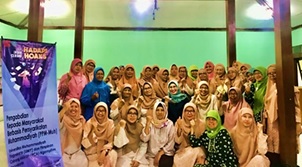Pemberdayaan Cabang Aisyiyah Ngampilan Yogyakarta melalui Literasi "Media Sehat" Empowerment of Yogyakarta Ngampilan Aisyiyah Branch through "Healthy Media" Literacy
Main Article Content
Abstract
We currently live amid the rapid development of communication systems and the media's tightness, which makes everyone aware of any information conveyed. The coverage of lies or hoaxes is the focus of attention, especially in online media. Hoax is information that is engineered to cover up real information. Based on the Community Service Team's interviews and observations with partners, PCA members and administrators are acting as consumers of mass media, especially TV and internet media, namely WA, as daily information media. In its management activities, media literacy has never been carried out, even though media literacy needs an empowered and information literate society. Thus, Community Service will be carried out through this community service activity in the form of Empowerment of Aisyiyah Ngampilan Branches through Healthy Media Literacy. The method carried out by the community service team is workshops related to the importance of media literacy in dealing with hoaxes; media literacy assistance in dealing with hoaxes; digital-based "Tabayun on information to be smart as a media literate person"; making a guide book for Healthy Media Literacy; Smart As Media literate individuals face hoaxes"; providing facilities for the Aisyiyah Ngampilan Branch office that can be used to support management activities of the Aisyiyah Ngampilan Yogyakarta Branch. This Muhammadiyah-based community service is the increased ability of the board and members, especially related to healthy media literacy in dealing with hoaxes.
Downloads
Article Details
Authors who publish with this journal agree to the following terms:
- Any article on the copyright is retained by the author(s).
- Author grant the journal, right of first publication with the work simultaneously licensed under a Creative Commons Attribution License that allows others to share work with acknowledgment of the work authors and initial publications in this journal.
- Authors are able to enter into a separate, additional contractual arrangements for non-exclusive distribution of published articles of work (eg, post-institutional repository) or publish it in a book, with acknowledgment of its initial publication in this journal.
- Authors are permitted and encouraged to post their work online (e.g., in institutional repositories or on their websites) prior to and during the submission process, as can lead to productive exchanges, as well as earlier and greater citation of published work.
- The article and any associated published material is distributed under the Creative Commons Attribution-ShareAlike 4.0 International License
References
Fatmawati, K., Zuthfiyah, R., Kafa, R.A. 2020. Demokrasi Dalam Penggunaan Media Sosial (Studi Kasus Postingan Di Twitter Tentang Anggaran Lem Aibon Pemerintah Provinsi Dki Jakarta). JMAN (Jurnal Mahasiswa Administrasi Negara). 4(1):14-25.
Gumilar, G., Adiprasetio, J., Maharani, N. 2017. Literasi Media: Cerdas Menggunakan Media Sosial Dalam Menanggulangi Berita Palsu (Hoax) Oleh Siswa SMA. Jurnal Pengabdian Kepada Masyarakat. 1(1):35-40.
Iriantara, Y. 2009. Literasi Media: Apa, Mengapa, Bagaimana. Bandung: Simbiosa Rekatama Media
Nashrullah, R. 2015. Media sosial Perspektif Komunikasi ,Budaya, dan Sosioteknologi. Bandung: Simbiosa Rekatama Media
Purba, R. 2015. Tingkat Literasi Media Pada Mahasiswa (Studi Deskriptif Pengukuran Tingkat Literasi Media Berbasis Individual Competence Framework Pada Mahasiswa Departemen Ilmu Komunikasi USU). Jurnal Ilmu Komunikasi Flow. 2(9):1-10.
Sebayang, E.R. 2019. Mempertahankan Identitas Nasional Di Era Digital. Rangkiang: Jurnal Pengabdian Pada Masyarakat. 1(2):107-110. https://doi.org/10.22202/rangkiang.2019.v1i2.3778
Silverblatt, A. 1995. Media Literacy: Keys to Interpreting Media Messages. London: Praeger
Thompson, D. 2014. The Facebook Effect on the News. The Atlantic. https://www.theatlantic.com/business/archive/2014/02/the-facebook-effect-on-the-news/283746/
Zakirah, D.M.A. 2020. Pengaruh Hoax di Media Sosial Terhadap Preferensi Sosial Politik Remaja di Surabaya. Jurnal Mediakita : Jurnal Komunikasi dan Penyiaran Islam. 4(1):1-10. https://doi.org/10.30762/mediakita.v4i1.2446
